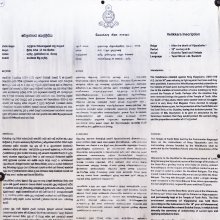Yayin, Yayi, Yayī, Yāyī, Yāyin: 24 definitions
Introduction:
Yayin means something in Hinduism, Sanskrit, Buddhism, Pali, Marathi. If you want to know the exact meaning, history, etymology or English translation of this term then check out the descriptions on this page. Add your comment or reference to a book if you want to contribute to this summary article.
Images (photo gallery)
In Hinduism
Ayurveda (science of life)
Veterinary Medicine (The study and treatment of Animals)
Source: Shodhganga: Portrayal of Animal Kingdom (Tiryaks) in Epics An Analytical studyYayi (ययि) (lit. “one who is running like a cloud”) is a synonym (another name) for the Horse (Aśva), according to scientific texts such as the Mṛgapakṣiśāstra (Mriga-pakshi-shastra) or “the ancient Indian science of animals and birds” by Hamsadeva, containing the varieties and descriptions of the animals and birds seen in the Sanskrit Epics such as the Ramayana and Mahabharata.

Āyurveda (आयुर्वेद, ayurveda) is a branch of Indian science dealing with medicine, herbalism, taxology, anatomy, surgery, alchemy and related topics. Traditional practice of Āyurveda in ancient India dates back to at least the first millenium BC. Literature is commonly written in Sanskrit using various poetic metres.
Jyotisha (astronomy and astrology)
Source: Wisdom Library: Brihat Samhita by Varahamihira1) Yāyin (यायिन्) refers to “travelers”, according to the Bṛhatsaṃhitā (chapter 9), an encyclopedic Sanskrit work written by Varāhamihira mainly focusing on the science of ancient Indian astronomy astronomy (Jyotiṣa).—Accordingly, “If Venus should enter the constellation of Śatabhiṣaja, drunkards or dealers in liquor will suffer; if she should enter the constellation of Pūrvabhādra, gamblers will suffer as well as the Kauravas and the Pāñcālas, and there will be rain in the land. If Venus should enter the constellation of Uttarabhādra, fruits and roots will be injured; if she should enter the constellation of Revatī, travellers [i.e., yāyin] will suffer; if she should enter Aśvinī, horsekeepers will suffer and if she should enter Bharaṇī, hillmen and the Yavanas will suffer”.
2) Yāyin (यायिन्) is the name of the sun (when in the west), according to the Bṛhatsaṃhitā (chapter 17) (“On planetary conjunctions—grahayuddha”), an encyclopedic Sanskrit work written by Varāhamihira mainly focusing on the science of ancient Indian astronomy astronomy (Jyotiṣa).—Accordingly, “The Sun when in mid-heaven is known as an Ākranda planet; when in the east he is known as a Paura planet and when in the west he is known as a Yāyin planet. Mercury, Jupiter and Saturn are always known as Paura planets. The Moon is always known as an Ākranda planet. Ketu, Mars, Rahu and Venus are known as Yāyin planets. The planet that suffers defeat in conjunction will cause suffering to the objects it represents; but if triumphant, the objects will prosper”.

Jyotisha (ज्योतिष, jyotiṣa or jyotish) refers to ‘astronomy’ or “Vedic astrology” and represents the fifth of the six Vedangas (additional sciences to be studied along with the Vedas). Jyotisha concerns itself with the study and prediction of the movements of celestial bodies, in order to calculate the auspicious time for rituals and ceremonies.
Languages of India and abroad
Pali-English dictionary
Source: BuddhaSasana: Concise Pali-English Dictionaryyāyī : (m.) one who goes. (in cpds.), such as sīghayāyī.
Source: Sutta: The Pali Text Society's Pali-English DictionaryYāyin, (adj.) (-°) (fr. yā, see yāti) going, going on to; in yāna-yāyinī (f.) Th. 2, 389 (maggaṭṭhaṅgika° having ascended the carriage of the 8—fold Path; explained by “ariya-yāyena nibbāna-puraṃ yāyinī upagatā” ThA. 257). (Page 554)

Pali is the language of the Tipiṭaka, which is the sacred canon of Theravāda Buddhism and contains much of the Buddha’s speech. Closeley related to Sanskrit, both languages are used interchangeably between religions.
Marathi-English dictionary
Source: DDSA: The Molesworth Marathi and English DictionaryYāyī (यायी).—m (S) A traveler; a passenger or sojourner; one that comes. 2 Any adventitious occurrence or occasion; an emergency, a contingency.
Source: DDSA: The Aryabhusan school dictionary, Marathi-EnglishYāyī (यायी).—m A traveller. A contingency.
Marathi is an Indo-European language having over 70 million native speakers people in (predominantly) Maharashtra India. Marathi, like many other Indo-Aryan languages, evolved from early forms of Prakrit, which itself is a subset of Sanskrit, one of the most ancient languages of the world.
Sanskrit dictionary
Source: DDSA: The practical Sanskrit-English dictionaryYayi (ययि) or Yayī (ययी).—m. [cf. Uṇādi-sūtra 3.159]
1) A horse fit for the Aśvamedha (or any) sacrifice.
2) A horse in general.
3) A road.
4) Name of Śiva.
5) A cloud.
Derivable forms: yayiḥ (ययिः).
Source: DDSA: The practical Sanskrit-English dictionaryYayin (ययिन्).—m. Name of Śiva.
--- OR ---
Yāyin (यायिन्).—a.
1) Going, moving, travelling (at the end of comp.).
2) Driving in, riding or going in.
3) Leading to; चित्रकूटयायिनि वर्त्मनि (citrakūṭayāyini vartmani) Uttararāmacarita 1.
4) Going to war (applied to planets opposite to each other).
Source: Cologne Digital Sanskrit Dictionaries: Shabda-Sagara Sanskrit-English DictionaryYayi (ययि).—m. (-yiḥ or yī) 1. A road. 2. A name of Siva. 3. A horse. E. yā to go, Unadi aff. i.
Source: Cologne Digital Sanskrit Dictionaries: Shabda-Sagara Sanskrit-English DictionaryYāyin (यायिन्).—mfn. (-yī-yinī-yi) Going, who or what goes. E. yā to go, ṇini aff., yuk inserted.
Source: Cologne Digital Sanskrit Dictionaries: Benfey Sanskrit-English DictionaryYayi (ययि).— (vb. yā, red.), A cloud Chr. 293, 2 = [Rigveda.] i. 87, 2.
--- OR ---
Yayī (ययी).— (cf. yayi), m. A horse.
Source: Cologne Digital Sanskrit Dictionaries: Benfey Sanskrit-English DictionaryYayin (ययिन्).—(vb. yā, red., + in), m. Śiva.
--- OR ---
Yāyin (यायिन्).—[-yāyin], i. e. yā + in, adj. 1. Going in; e. g. nau-, adj. sbst. Who or what goes in a boat, [Mānavadharmaśāstra] 8, 409. 2. Leading to, [Uttara Rāmacarita, 2. ed. Calc., 1862.] 15, 10 (citrakūta-, to the mount of Citrakūta). 3. satata-, adj. Taking place continually, [Mānavadharmaśāstra] 1, 50. samudra-, adj. m. A navigator of the ocean, 3, 158.
Source: Cologne Digital Sanskrit Dictionaries: Cappeller Sanskrit-English DictionaryYayi (ययि).—[adjective] running, hastening; [masculine] cloud.
--- OR ---
Yayī (ययी).—[adjective] running, hastening; [masculine] cloud.
Source: Cologne Digital Sanskrit Dictionaries: Cappeller Sanskrit-English DictionaryYāyin (यायिन्).—[adjective] going, running, flying, travelling.
Source: Cologne Digital Sanskrit Dictionaries: Monier-Williams Sanskrit-English Dictionary1) Yayi (ययि):—mfn. (√yā) going, hastening, quick, [Ṛg-veda]
2) m. a cloud, [ib.]
3) Yayī (ययी):—[from yayi] mfn. = yayi, [Ṛg-veda]
4) [v.s. ...] m. a horse, [cf. Lexicographers, esp. such as amarasiṃha, halāyudha, hemacandra, etc.]
5) [v.s. ...] Name of Śiva, [cf. Lexicographers, esp. such as amarasiṃha, halāyudha, hemacandra, etc.]
Source: Cologne Digital Sanskrit Dictionaries: Monier-Williams Sanskrit-English Dictionary1) Yayin (ययिन्):—[from yayi] mfn. = [preceding] (See ni-yayin)
2) [v.s. ...] m. Name of Śiva, [cf. Lexicographers, esp. such as amarasiṃha, halāyudha, hemacandra, etc.]
3) Yāyin (यायिन्):—[from yā] mfn. (mostly ifc.) going, moving, riding, driving, flying, travelling, marching, taking the field, going to war (also applied to planets opposed to each other in the graha-yuddha q.v.), [Mahābhārata; Kāvya literature etc.]
Source: Cologne Digital Sanskrit Dictionaries: Yates Sanskrit-English DictionaryYayī (ययी):—(yī) 3. m. Shiva; a road.
Source: Cologne Digital Sanskrit Dictionaries: Yates Sanskrit-English DictionaryYāyin (यायिन्):—[(yī-yinī-yi) a.] Going.
Source: DDSA: Paia-sadda-mahannavo; a comprehensive Prakrit Hindi dictionary (S)Yāyin (यायिन्) in the Sanskrit language is related to the Prakrit word: Jāi.
[Sanskrit to German]
Sanskrit, also spelled संस्कृतम् (saṃskṛtam), is an ancient language of India commonly seen as the grandmother of the Indo-European language family (even English!). Closely allied with Prakrit and Pali, Sanskrit is more exhaustive in both grammar and terms and has the most extensive collection of literature in the world, greatly surpassing its sister-languages Greek and Latin.
Kannada-English dictionary
Source: Alar: Kannada-English corpusYāyi (ಯಾಯಿ):—[adjective] moving; wandering; roaming.
--- OR ---
Yāyi (ಯಾಯಿ):—[noun] a man who is travelling; a traveller.
--- OR ---
Yāyi (ಯಾಯಿ):—[noun] the tree Ailanthus excelsa.
Kannada is a Dravidian language (as opposed to the Indo-European language family) mainly spoken in the southwestern region of India.
See also (Relevant definitions)
Ends with (+56): Abhidhyayin, Abhiprayayin, Abhiyayin, Adhyayin, Agrayayin, Ahutadhyayin, Ajnanuyayin, Akhyayin, Ananudhyayin, Anudhyayin, Anuyayin, Anvayayin, Anyayin, Apavyayin, Apratyakhyayin, Apratyayin, Apriyakhyayin, Apyayin, Arthanuyayin, Ativyayin.
Full-text (+40): Anuyayin, Manoyayin, Agrayayin, Turangayayin, Samudrayayin, Saralayayin, Nauyayin, Manoyayitva, Durayayin, Satatayayin, Prishthayayin, Niyayin, Jai, Satatagata, Shatayayivat, Jaraya, Satatagati, Nagarayayigraha, Durayayina, Anuyayita.
Relevant text
Search found 4 books and stories containing Yayin, Yāyi, Yayi, Yayī, Yāyī, Yāyin; (plurals include: Yayins, Yāyis, Yayis, Yayīs, Yāyīs, Yāyins). You can also click to the full overview containing English textual excerpts. Below are direct links for the most relevant articles:
Rig Veda (translation and commentary) (by H. H. Wilson)
Chandogya Upanishad (Madhva commentary) (by Srisa Chandra Vasu)
Garga Samhita (English) (by Danavir Goswami)
Verse 4.2.11 < [Chapter 2 - The Story of the Gopīs That Had Been Sages]
Verse 2.24.39 < [Chapter 24 - The Story of Asuri Muni in the Rāsa-dance Pastime]
Verse 8.13.57 < [Chapter 13 - A Thousand Names of Lord Balarāma]
Brihat Samhita (by N. Chidambaram Iyer)




